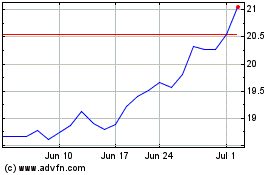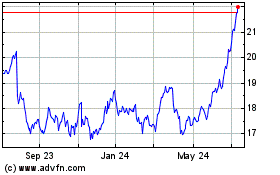TPG Telecom Abandons Plans for Mobile Network Using Huawei Equipment -- Update
29 January 2019 - 11:06AM
Dow Jones News
By Robb M. Stewart
MELBOURNE, Australia--An Australian company's plan to build a
US$1 billion mobile telecoms network has collapsed after Canberra
blocked use of equipment made by China's Huawei Technologies Co. on
national security grounds.
TPG Telecom Ltd.'s decision to abandon the mobile rollout after
investing about 100 million Australian dollars (US$71.8 million) in
early work illustrates how increasing government scrutiny of Huawei
is stoking uncertainty among businesses, many of whom had favored
Huawei for its competitive prices and customer service. TPG had
hoped to become Australia's fourth mobile operator in a market that
includes units of Vodafone Group and Singapore Telecommunications
Ltd.
Wireless carriers around the world are preparing to spend
billions on hardware for 5G, the coming generation of superfast
wireless technology, to replace current 4G networks.
In 2017, TPG outlined its ambition to challenge Australia's
incumbent mobile telecoms operators with its own network in
response to the shift by consumers to mobile devices and
competition from other companies reselling capacity on the
government-built National Broadband Network. The fiber network is
the core of TPG's fixed-line telecommunications business.
TPG wanted Huawei to be its main equipment provider because the
Chinese company's gear offered a simple path to upgrade to a
next-generation 5G network. It had already bought and installed
some Huawei equipment when Canberra joined the U.S. in restricting
the Chinese company's sales because of national-security
concerns.
"In light of the government's announcement in late August 2018
that it would prohibit the use of Huawei equipment in 5G networks,
that upgrade path has now been blocked," TPG said on Tuesday.
A Huawei spokesperson wasn't immediately available for comment.
Huawei has said it is employee-owned and not beholden to Beijing or
any government. It says its equipment poses no more threat than any
other supplier, because of the industry's reliance on common
suppliers with major Chinese operations.
TPG's move comes just days after Vodafone, the world's biggest
mobile carrier outside China, said it is temporarily halting
purchases of some components made by Huawei. Another major British
carrier, BT Group PLC, said late last year it was replacing Huawei
gear with competitors' in its network cores.
TPG said it had looked for ways to overcome the problem created
by the Huawei ban, but was unsuccessful. "It does not make
commercial sense to invest further shareholder funds (beyond that
which is already committed) in a network that cannot be upgraded to
5G," the company said.
Australia is part of the so-called Five Eyes alliance that
shares intelligence, which also includes the U.S., U.K. and Canada.
The U.S. has long labeled Huawei a national-security threat.
Officials say they worry Beijing could compel the company or its
employees to use its gear and know-how to spy or disable foreign
systems.
In a pair of cases unsealed Monday, U.S. federal prosecutors
accused Huawei of violating U.S. sanctions on Iran and of stealing
trade secrets from a U.S. business partner, portraying the company
as flouting U.S. laws while trying to do business in the
country.
U.S. lawmakers have accused Huawei of spying and criticized it
over suspected links to the Chinese government and the People's
Liberation Army. American officials have launched a global campaign
to persuade the country's allies to shun Huawei.
Write to Robb M. Stewart at robb.stewart@wsj.com
(END) Dow Jones Newswires
January 28, 2019 18:51 ET (23:51 GMT)
Copyright (c) 2019 Dow Jones & Company, Inc.
Singapore Telecommunicat... (PK) (USOTC:SGAPY)
Historical Stock Chart
From Dec 2024 to Jan 2025

Singapore Telecommunicat... (PK) (USOTC:SGAPY)
Historical Stock Chart
From Jan 2024 to Jan 2025
